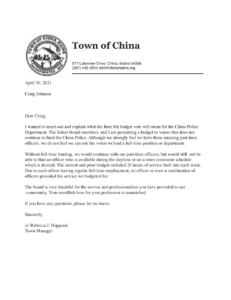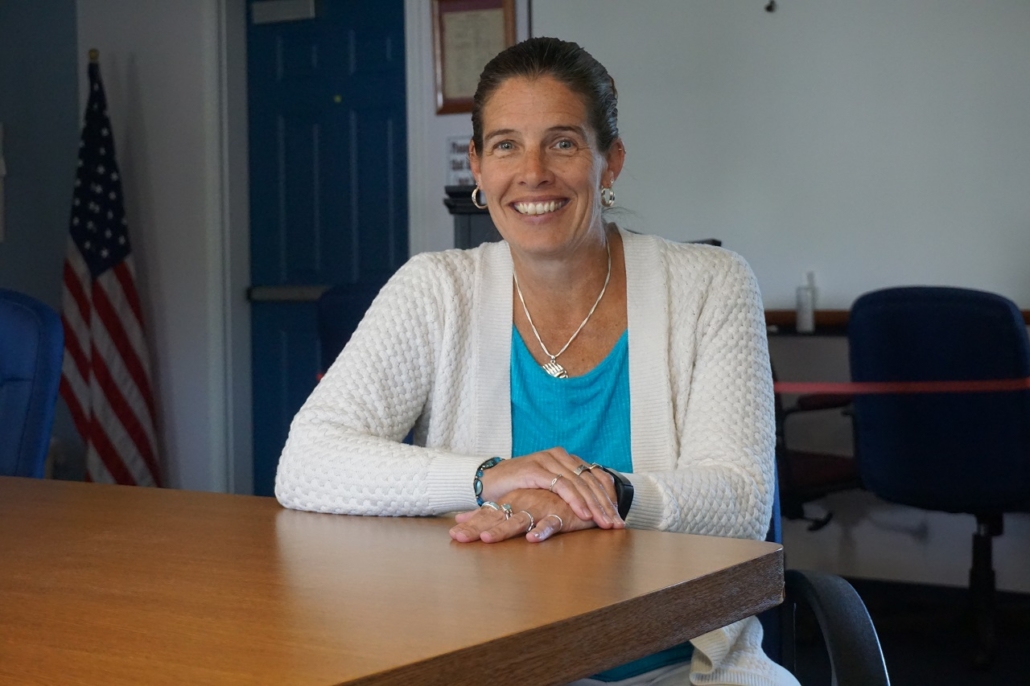CBC decision makes it easier for consultants to prepare costs
 by Mary Grow
by Mary Grow
At their May 13 meeting, China Broadband Committee (CBC) members unanimously approved one piece of the outline of their proposed China Community Broadband Project, making it easier for their consultants to prepare cost scenarios.
The program they intend to offer will have three tiers, or service levels, providing different capacities at different prices, plus a fourth, higher tier committee member Neil Farrington named “the Tod tier” in honor of self-described geek and committee member Tod Detre. Detre admits he will want more capacity than most other users in town.
Consultants Mark Van Loan and John Dougherty, of Mission Broadband, and Mark Ouellette, President of Machias-based Axiom Technologies, the planned service provider, can use the framework to work out cost-sharing alternatives.
As at prior meetings, committee members and consultants described two broad cost categories, construction and on-going service. The plan is that the town of China will issue a bond to cover construction costs, and will own the network. User fees will cover bond repayment, plus service provided by Axiom (or in the future perhaps another company, if the network owner so decides), plus a reasonable profit for Axiom.
The May 13 discussion included the per-house connection to the network, estimated to average $1,300. Committee members considered asking householders to pay some or all of the fee; no decision was made.
Construction costs are currently estimated in the $8 to $9 million range. But, Van Loan and Ouellette agreed, any construction company will estimate for maximum conceivable needs; once its representatives survey the situation, costs are likely to come down.
Ouellette has dealt with another Maine town whose officials used taxes to fund construction. CBC members do not want to propose a tax increase.
Another issue is different rates for seasonal residents, which can be managed in multiple ways.
User fees, at least initially, will depend to a great extent on the “take rate,” how many people sign up for the new service and share the costs. Committee members talked briefly, again, about ways to provide information to residents.
Funding from grants is another possibility not yet either guaranteed or ruled out. CBC Chairman Robert O’Connor is working on a federal grant application, and got suggestions from Van Loan and Ouellette.
Ouellette said Axiom was approved for a federal subsidy program through the Federal Communications Commission a few hours before the China meeting; “I have no idea how it’s going to work.”
Ouellette said in his experience, in a town like China with established internet service providers, up to 40 percent of householders are likely to try Axiom promptly, with 70 percent choosing the lowest of the tiers. He has repeatedly said that once people see how fast and reliable Axiom’s service is, his customer base grows.
Van Loan and Ouellette offered to have updated information, based on a three-tier plus the “Tod tier” system, available within a week for committee members to review before their next meeting, scheduled for 4:30 p.m. Wednesday, May 26.
The CBC is likely to continue to meet earlier than its previous 7 p.m., though not always as early as 4:30 p.m., to accommodate Ouellette, who explained he has family obligations in mid-evening.



 by The Town Line staff
by The Town Line staff
 The following is a reprint of a letter sent to the Morning Sentinel writer Greg Levinsky, from China Police Chief Craig Johnson, provided to The Town Line by Chief Johnson.
The following is a reprint of a letter sent to the Morning Sentinel writer Greg Levinsky, from China Police Chief Craig Johnson, provided to The Town Line by Chief Johnson.



